LASER DENTAL TREATMENT
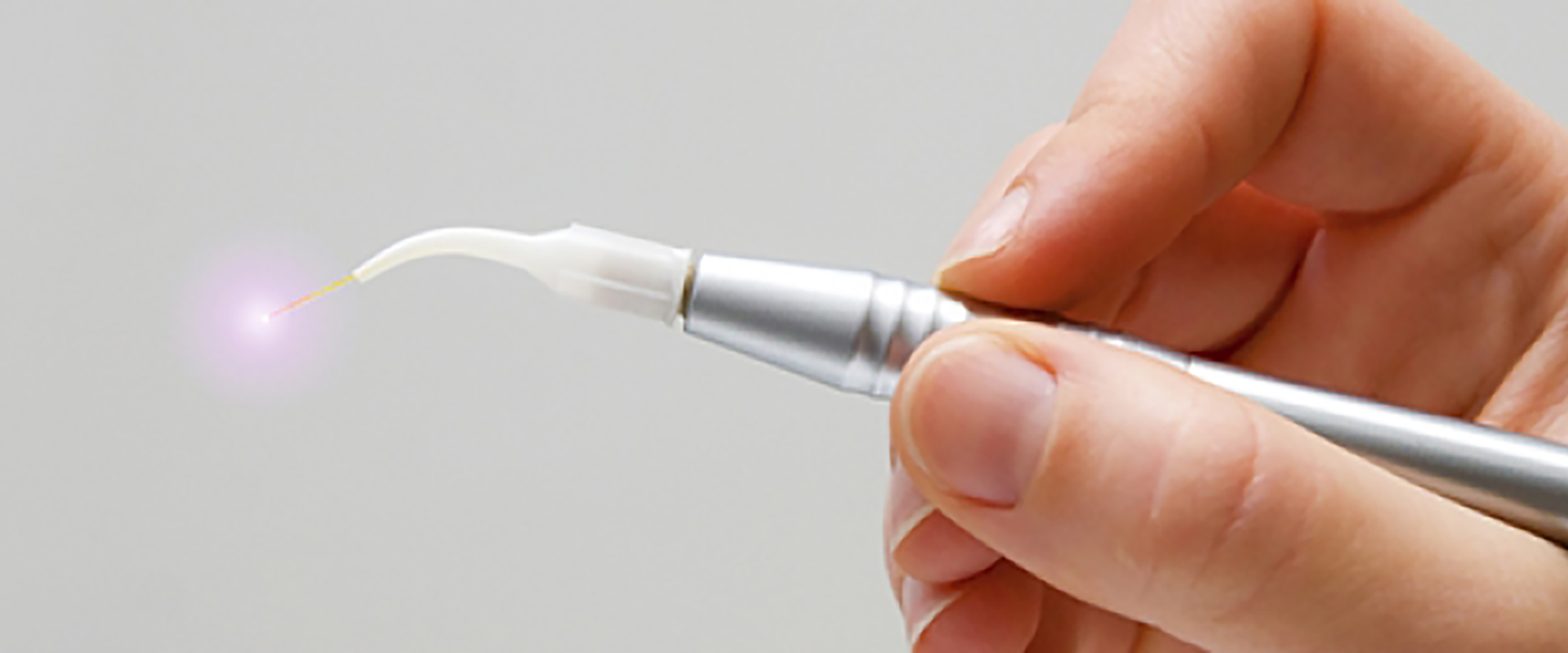
Dr.Shwetha's Dental is equipped with the latest technology in dentistry. Lasers are one such exciting advancement in the dental field that we have incorporated in our dental practice. The laser never actually touches your tooth or gums, just the light. Laser dentistry reduces if not eliminates the need for anesthesia, causes minimal pain and bleeding and considerably reduces healing time. Consequently you spend less time in the dental chair and have a more pleasant dental treatment with more predictable results. Laser equipment carry the laser power to the hand piece through fibre optic cables and is emitted through the tip of the instrument enabling the dental microsurgical procedures. It offers treatment that is very effective, faster, precise and comfortable to the patient. Laser offer great advantages to the patients when compared to other conventional cosmetic and general dental surgery procedures.
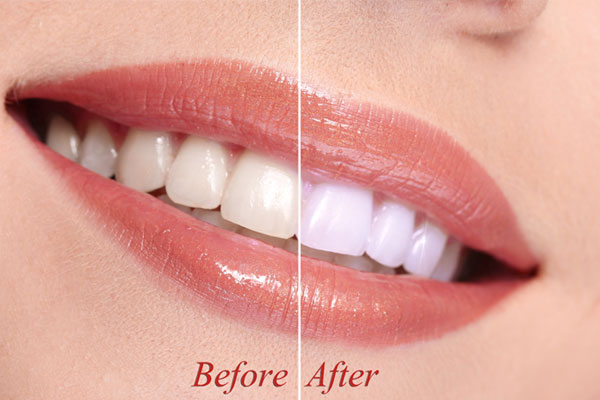
Laser teeth whitening
Laser whitening is effective and has become extremely popular over the past decade. Doctor Smile LWS TITANIUM – Laser Whitening System with TiO2 is the safest and fastest way to whiten the teeth, removing the most difficult discolouration from your teeth caused by different agents such as coffee, tobacco, wine and other pigmented stains.
PERIODONTAL TREATMENTS

Dr.Shwetha is the best and highly trained specialist in the Laser for periodontal treatments.
LASER GUM DEPIGMENTATION
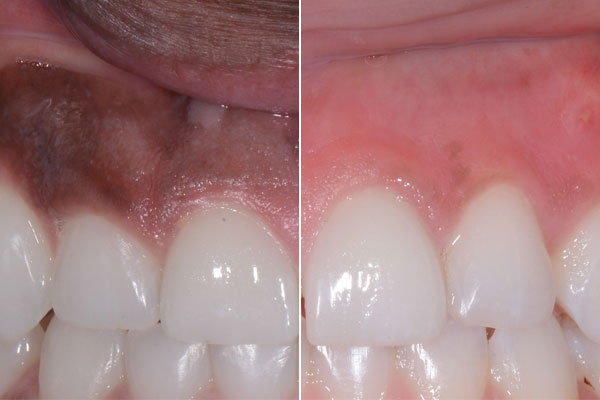
Gum depigmentation is a procedure used in cosmetic dentistry to remove black spots or patches on the gums caused by excessive melanin. The normal color of the gum tissue (gingiva) is pink, but excess deposits of melanin (melanin gingival hyperpigmentation) can create what seem to be black spots or patches on the gums, creating an aesthetic or cosmetic problem. Discoloration may also be caused by long term use of certain medications.
A clinical assessment is carried out to customize the treatment to the patients needs, and the procedure itself can involve laser ablation techniques.
Laser Gum Depigmentation Techniques (Laser Gum Bleaching)
Melanocytes are cells which reside in the basal layer of the gingival epithelium. These cells produce melanin, which are pigments that cause discoloration or dark spots in gums. A dental laser can target and ablate the melanocytes, thus reducing the production of melanin in the gingival tissue. Following laser depigmentation, the gingiva heals by secondary intention. This results in a lighter and more uniform colour of the gums.
LASER GUM SURGERY
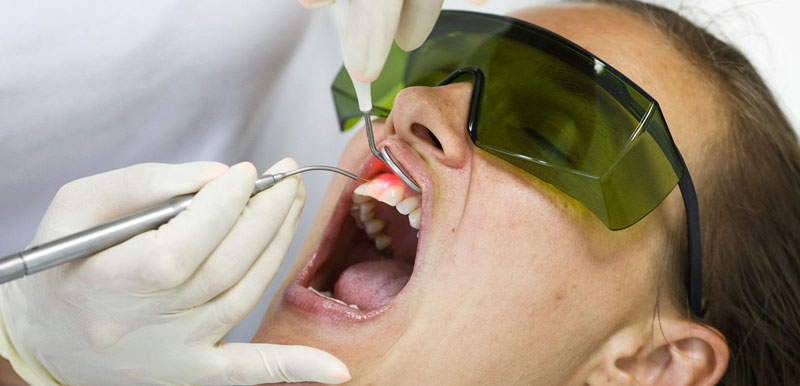
Periolase treatment is the removal of infected tissue, debris, and bacteria, as well as stimulation of the bone and surrounding gum tissue for reattachment. The best news about the new laser technology is that, unlike traditional "flap" surgery, laser gum surgery promotes regeneration of diseased gum and root surfaces. The patient experiences no gum recession and no side effects than from scalpel surgery.
There is also a much lower chance of gum disease returning after laser gum surgery, since there is regrowth of the connective tissue. Other benefits include a nearly pain-free experience, very little recovery time, if any, and no higher cost than traditional scalpel gum surgery.
The Process
After an initial exam and x-rays, the periodontist will proceed to treat one half of the mouth at a time.
Each session takes about two hours and includes the use of local anesthetic. After the area is numb, the periodontist will use the laser to seek out and destroy all the diseased gum tissue. It is then removed through a combination of water, suction and laser. Next, the doctor will use the laser to stimulate the regrowth and reattachment of the gum tissue to the bone. The patient's bite is also adjusted to prevent unwanted grinding, and patients are usually given a bite guard to wear.
Laser Gum Surgery Post Operative Treatment and Recovery.
There is minimal recovery time after the laser gum surgery. The patient can drive themselves home and even return to work the same day. It is a good idea to take it easy for the first 24 hours, and antibiotic and anti-inflammatory medications are taken to prevent infection and reduce swelling.
Crucial to the healing and regeneration at this point are the instructions to refrain from brushing teeth for about a week after the procedure. Gentle rinsing and rubbing the tooth lightly with a cotton swab is the most agitation allowed inside the mouth. A liquid and soft food diet is also required for a week, to prevent any disturbance of the new blood clots which have formed during the procedure. Soon, these will heal into healthy, sealed gum tissue, preventing further infection and disease.
DENTAL FLAP SURGERIES AND BONE GRAFTS
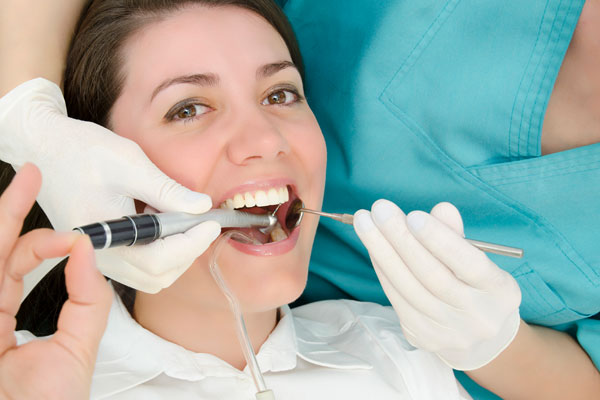
Bone grafting is a surgical procedure that replaces missing bone in order to repair bone fractures. The most common use of bone grafts is in the application of Dental implants. Dental bone grafting is a periodontal procedure that has been developed to regain the lost jaw bone. The jaw bone loss can be due to an infection or abscess, periodontal disease or trauma.
This surgery in dentistry requires a very high level of skills and Dr.Shwetha is highly experienced and successful expert who routinely attend to such cases. Dr.Shwetha’s Dental and Implant Center have the required infrastructure, equipment and technology to handle such surgical cases which is why they are a famous name in the area of bone grafting and surgery.
DESENSITIZATION TREATMENT

Patients complain about teeth that are intermittently painful and hyper sensitive to cold and hot food. This pain in most cases is triggered by actions such as drinking a hot or cold beverage, eating a sweet or sour food, or dental manipulations such as touching the tooth or directing an air blast on it. The problem is known as dentinal hypersensitivity, may be a relatively simple one to treat. This is very effectively treated with dental lasers.
Desensitization - Using Dental Laser
Dentine hypersensitivity is prevalent amongst a large portion of individuals in the age group of 30 to 40 years. The result is oral discomfort generated by pain, and may lead to nutritional deficiency due to dietary restrictions . Normally, dentine is covered by enamel or cement and does not suffer direct stimulation. Only with the exposure of the peripheral terminations of dentinal tubules is a situation of strong dentinal sensitivity manifested, termed hypersensitivity.
The most common factors responsible for dentine hypersensitivity are abrasion, caused by toothbrushing with inadequate intensity; abfraction, caused by tooth flexion associated with ill-directed occlusal forces, parafunctional habits or occlusal disequilibrium; erosion, as an effect of acids in the oral cavity; anatomic predisposition due to structural deficiency in the enamel-cement junction; cavity preparations in teeth with pulp vitality that expose the dentine; as well as improperly controlled dentinal acid conditioning.
Any treatment, which reduces the dentinal permeability, must diminish dentinal sensitivity. The effectiveness of dentine desensitization agents is directly related to their capacity to promote the sealing of the dentinal canaliculi.
With the advent of laser technology and its growing utilization in dentistry, an additional therapeutic option is available for the treatment of dentinal pain. The laser, by interacting with the tissue, causes different tissue reactions, according to its active medium, wavelength and power density and to the optical properties of the target tissue.
The effectiveness of dentine hypersensitivity treatment with diode laser, with different wavelengths, has been reported in various clinical studies.We @ Shwethas Dental Have Been Using Dental Lasers for Treatment of Hypersensitivity Very Effectively.